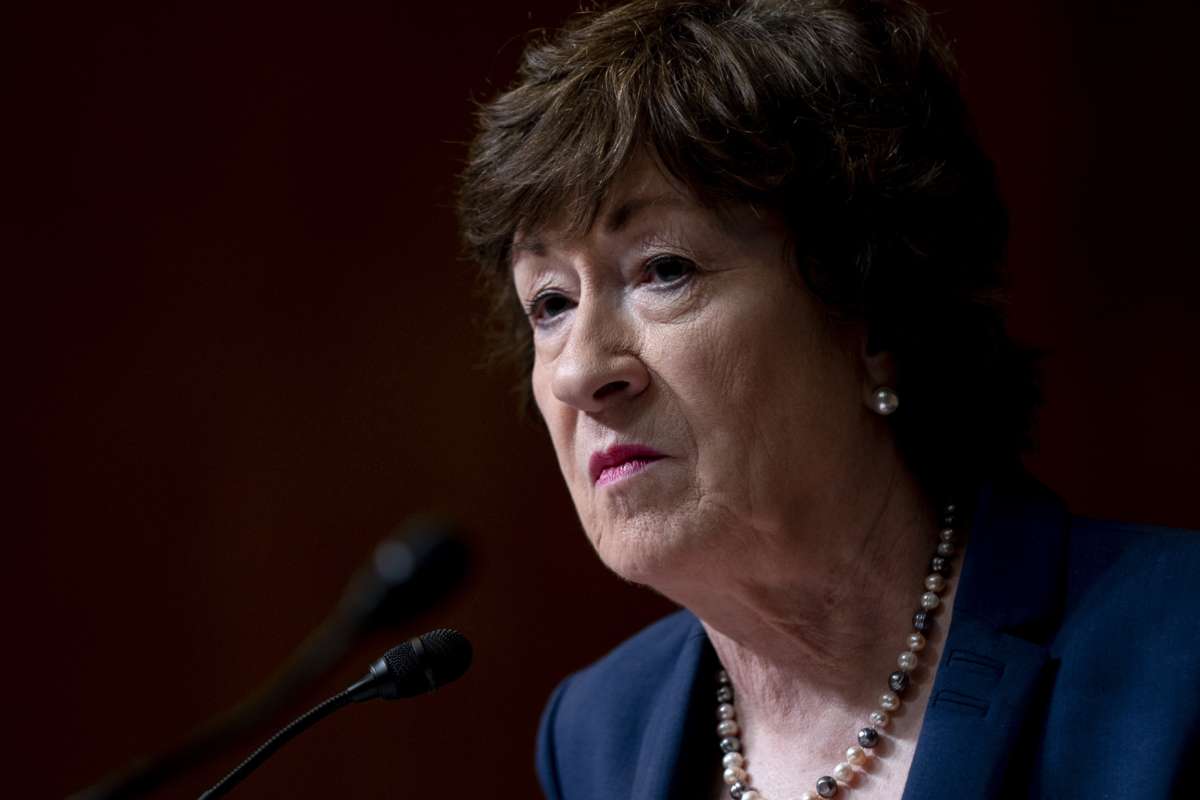Honest, paywall-free news is rare. Please support our boldly independent journalism with a donation of any size.
Sen. Susan Collins (R-Maine), a Republican who bills herself as moderate on issues of abortion rights, said on Tuesday that she will not support legislative efforts being proposed by Democrats to codify such rights into federal law.
The Women’s Health Protection Act, which is expected to pass in the House of Representatives, is bound to face difficulties in the Senate, as it could be blocked by a Republican filibuster. However, the bill’s prospects would have been somewhat better had Collins expressed her support.
The legislation, if it became law, would protect abortion access throughout the entirety of the United States. Among a number of other items, the bill would disallow state-imposed restrictions, including 20-week abortion bans. It also seeks to end requirements like ultrasounds and counseling services before abortions are performed — rules imposed by many states across the U.S. to shame and discourage individuals who are seeking abortions.
Collins said she supports the idea of codifying Roe v. Wade, the 1973 Supreme Court case recognizing abortion rights, citing instances in the past when she’s done so. But despite escalating attacks on bodily autonomy and reproductive health care in states across the U.S, Collins expressed an unwillingness to do so now, complaining that the current bill goes too far.
“I support codifying Roe. Unfortunately the bill … goes way beyond that,” she said, per reporting from The Los Angeles Times. “It would severely weaken the conscious exceptions that are in the current law.”
Collins also said that she believes the bill would weaken religious freedoms. She left open the possibility of supporting a less protective bill from Democrats in the future.
Her opposition to the legislation will likely lead to more distrust from her pro-choice colleagues on Capitol Hill, as her actions have demonstrated she is no longer an unwavering voice on the issue.
On social media, critics took note of Collins’s opposition to the bill, and condemned news articles with taglines claiming that the lawmaker supports legal access to abortion.
“We don’t *have to* say Collins ‘supports abortion rights’ when she clearly doesn’t. Just because she says so,” wrote Elie Mystal, justice correspondent for The Nation.
In recent years, Collins has turned her back on abortion rights activists more than once, particularly when she voted to confirm Justice Brett Kavanaugh in 2018, despite his alleged history of sexual assault and the fact that many rightfully believed he would be an anti-abortion vote on the Supreme Court’s bench. Earlier this month, Kavanaugh joined four other conservatives on the Court in refusing to hear challenges to a restrictive abortion law in Texas, which bans the procedure after six weeks of pregnancy.
Collins suggested she did not regret her vote for Kavanaugh, and defended the Court’s actions this month, arguing that there were “serious constitutional and procedural issues” that warranted the Court’s refusal to intervene and protect the legal right to abortion access in Texas. That law, which has so far circumvented federal judicial review, is now being replicated in other parts of the country.
A terrifying moment. We appeal for your support.
In the last weeks, we have witnessed an authoritarian assault on communities in Minnesota and across the nation.
The need for truthful, grassroots reporting is urgent at this cataclysmic historical moment. Yet, Trump-aligned billionaires and other allies have taken over many legacy media outlets — the culmination of a decades-long campaign to place control of the narrative into the hands of the political right.
We refuse to let Trump’s blatant propaganda machine go unchecked. Untethered to corporate ownership or advertisers, Truthout remains fearless in our reporting and our determination to use journalism as a tool for justice.
But we need your help just to fund our basic expenses. Over 80 percent of Truthout’s funding comes from small individual donations from our community of readers, and over a third of our total budget is supported by recurring monthly donors.
Truthout has launched a fundraiser, and we have a goal to add 242 new monthly donors in the next 48 hours. Whether you can make a small monthly donation or a larger one-time gift, Truthout only works with your support.
